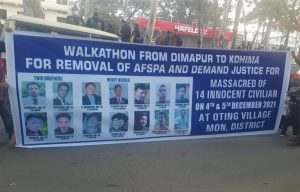The Indian government has repealed The Armed Forces (Special Powers) Act 1958 (AFSPA) from parts of India’s Northeast.
A controversial law which gives extraordinary powers to the security forces in counterinsurgency operations, AFSPA has now been lifted from 23 districts in Assam and partially lifted from seven districts in Nagaland, six districts in Manipur, and one district in Assam. All these states had been afflicted by insurgency for the past several decades.
India’s Minister for Home Affairs Amit Shah tweeted saying that the decision was a “significant step” resulting from the “improved security situation and fast-tracked development due to the consistent efforts and several agreements to end insurgency and bring lasting peace in Northeast” by the Narendra Modi government.
The act is imposed in “disturbed areas” for a period of six months following which a decision on its extension is reviewed by the government. It had been in operation in Assam for a brief period in the early 1980s when the state was engulfed by a mass movement against foreign nationals and then continuously since 1990. In Nagaland, the law was in force from the late 1950s and in Manipur (the Imphal Municipality area was exempted in 2004), from the early 1980s.
Earlier, beginning from 2015, the government had revoked AFSPA completely from the northeastern states of Tripura and Meghalaya, and partially from Arunachal Pradesh. After the new notification is released, the law will remain in force in parts of Assam, Nagaland, Manipur and Arunachal Pradesh, and also in the Union Territory of Jammu & Kashmir.
The trigger for the government’s current decision came from the massacre in Nagaland on December 4 last year when army soldiers killed six coal miners near Oting village after “mistaking” them for extremists. Seven other civilians and an army personnel were killed within hours at the same place when villagers retaliated. Subsequently, there were protests against the incident, which compelled the government to appoint a high-level committee to probe the episode.
For India’s ruling Bharatiya Janata Party (BJP), the law had become a major embarrassment as both, Assam and Manipur are ruled by the party and it is an ally of the coalition government in Nagaland. So the party was expected to accept the recommendation of the committee appointed after the Oting incident which had suggested revocation of the law in a phased manner from some zones in the three states.
The government is apprehensive of a renewed armed campaign by separatist rebel groups that have camps and training facilities in Myanmar. There are reports of these outfits regrouping and indulging in recruitment of fresh cadres.
This explains why the districts in the states of Manipur, Nagaland and Arunachal Pradesh bordering Myanmar are still under AFSPA.
The law has been revoked only in the districts where the possibility of violence by the separatist outfits or other rebel organizations is perceived by the government to be minimal.
Agitations against AFSPA have rocked the country’s northeast on many occasions in the past. There have been repeated allegations of “fake encounters” and other human rights violations by the security forces in so-called disturbed areas across the region.
In 2004, a group of elderly women disrobed at the gates of the historic Kangla Fort in Imphal as mark of protest against the killing of Thangjam Manorama by the Assam Rifles. Activists such as Irom Sharmila undertook a hunger strike against the law for as long as 16 years after ten civilians were gunned down in Manipur.
The extraordinary powers and legal immunity granted by AFSPA to the security forces are perceived as the primary reason for the atrocities in areas designated as “disturbed” by the government. These include the power to open fire upon anyone who is acting against law and order, arrest without a warrant, search any vehicle and prohibit a gathering of five or more people.
A public interest litigation (PIL) filed in the Supreme Court alleged that at least 1,528 extra-judicial killings took place in Manipur between 2000 and 2012. The petition argued that most of these killings were carried out in cold blood while the victims were in custody. A year later, the Supreme Court directed the Central Bureau of Investigation (CBI) to investigate several cases of alleged fake encounters in the state.
The AFSPA originated during the colonial regime in India when the government enacted a law as an ordinance in the backdrop of the Quit India Movement in 1942. After Independence, then Prime Minister Jawaharlal Nehru decided to continue with the law owing to the insurgency in Assam and Manipur. Later, it was replaced by the Armed Forces (Assam and Manipur) Special Powers Act, 1958 in 1958.

































